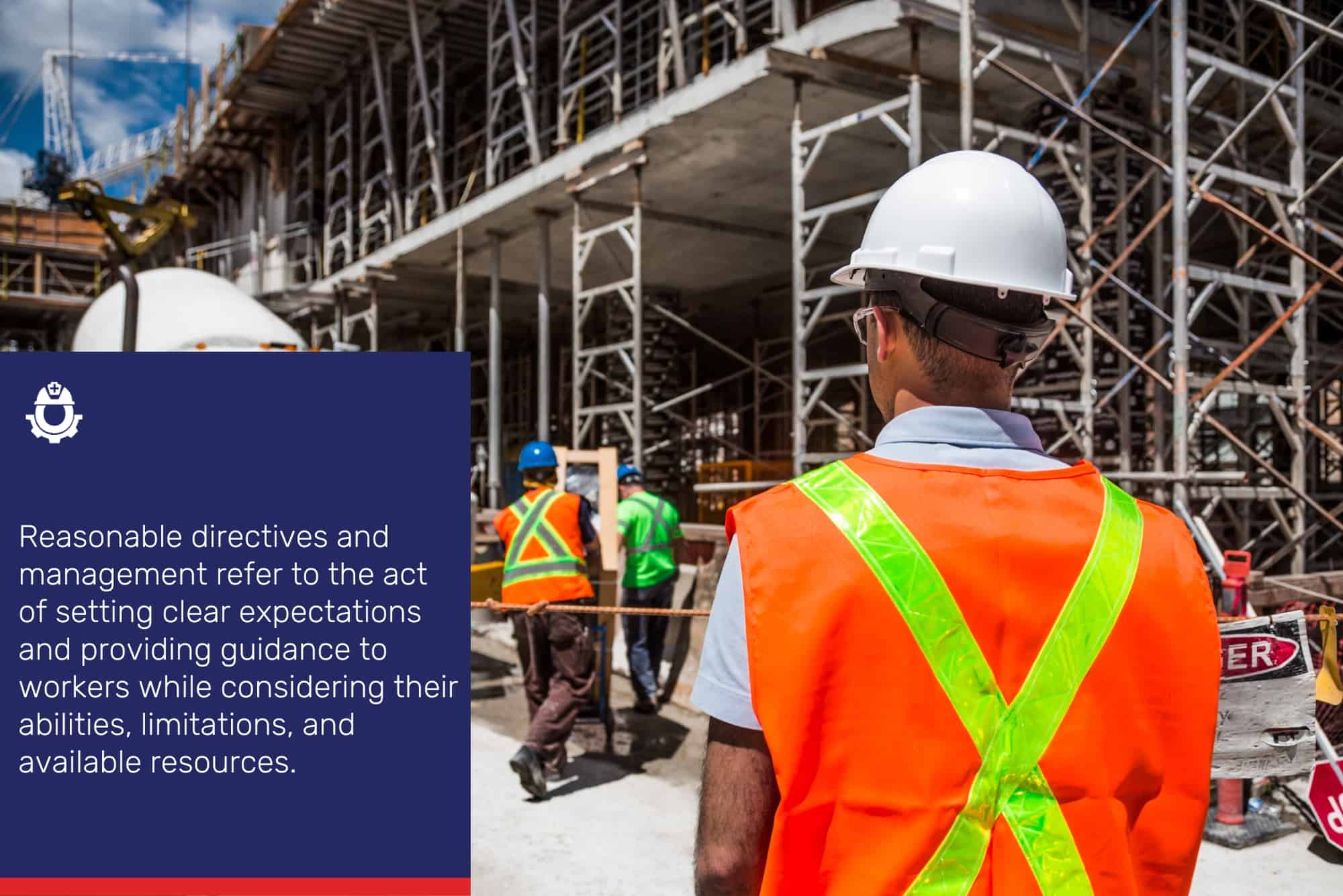Enhancing Business Productivity and Service Provision
As an expert in safety and business safety management coaching and mentoring, the role of a leader is crucial in ensuring that staff meet the quality standards and productivity requirements of a business. This involves providing reasonable directives, offering constructive feedback, and instructing workers on how to improve their job tasks. In this blog, we will explore the concept of reasonableness in leadership, discussing when, why, and how it should be applied to foster a culture of continuous improvement. By understanding the importance of reasonable directives and management, leaders can create an environment that enhances both business productivity and service provision.

Defining Reasonable Directives and Management
Reasonable directives and management refer to the act of setting clear expectations and providing guidance to workers while considering their abilities, limitations, and available resources. It involves striking a balance between pushing individuals to achieve their best and acknowledging their limitations. Reasonable management focuses on fostering a supportive and motivating environment that encourages growth and improvement
When to Provide Reasonable Directives
Reasonable directives should be provided consistently, particularly during the following scenarios:
- Onboarding – New workers need clear instructions and guidance to understand their roles and responsibilities effectively.
- Performance Evaluations – Regular feedback sessions allow leaders to provide constructive criticism and guidance to help workers improve their performance.
- Skill Development – When workers lack certain skills or knowledge, reasonable directives should be provided to bridge the gap and enhance their capabilities.
- Process Changes – When implementing new processes or systems, leaders should guide workers through the transition and offer support to adapt to the changes.
Why Reasonable Directives are Essential
Reasonable directives play a crucial role in enhancing job performance, worker satisfaction, and overall business success. Here are some key reasons why they are essential:
- Clarity – Clear expectations and instructions reduce ambiguity and confusion, ensuring workers understand what is expected of them.
- Motivation – Reasonable directives that acknowledge individual efforts and provide constructive feedback motivate workers to perform better.
- Skill Development – By offering guidance and support, leaders help workers develop new skills, improving their performance and fostering professional growth.
- Quality Assurance – Reasonable management ensures that workers consistently meet the quality standards and service provisions set by the business.
How to Provide Reasonable Directives
To provide reasonable directives effectively, leaders should consider the following approaches:
- Clear Communication – Ensure instructions are concise, specific, and easily understandable, avoiding jargon or ambiguity.
- Tailor Instructions – Adapt directives to the individual’s skill level, experience, and learning style to optimize their understanding and performance.
- Constructive Feedback – Provide feedback that highlights strengths, identifies areas for improvement, and suggests actionable steps to enhance performance.
- Support and Resources – Offer necessary resources, training, and support to enable workers to meet the expectations set for them.
- Encourage Collaboration – Foster a collaborative environment where workers can share ideas, seek assistance, and learn from one another.
- Lead by Example – Set a high standard by embodying the desired behaviours and work ethic, serving as a role model for workers to follow.
Duty of the worker
An integral part of any employment is the duty for workers to carry out a lawful and reasonable direction from management. Knowledge on what is ‘lawful and reasonable’ can help the leaders know exactly what they can ask their workers to do, as well as make it easy for workers to recognise if their rights in the workplace are being violated or they are being bullied.
Under the Fair Work Act 2009 and Fair Work Regulations, a worker may be guilty of serious misconduct for failing to carry out a lawful and reasonable instruction that is consistent with their contract of employment.

How to determine reasonable
When considering whether or not a directive is reasonable, the employer must consider the nature of the worker’s work, the terms of their contract of employment, customary practices and the usual course of dealing between the parties.
According to iHR Australia; determining whether something is reasonable requires considering, the following:
- The circumstances that led to and created the need for the management action to be take
- The circumstances while the management action was being taken, and
- The consequences that flowed from the management action
It’s important to note that whether a task could have been undertaken in a ‘more reasonable’ or ‘more acceptable’ manner is irrelevant.
Remember:
- A course of action may still be ‘reasonable action’ even if particular steps are not
- Any ‘unreasonableness’ must arise from the actual management action in question, rather than the worker’s perception of it, and
- Consideration may be given as to whether the management action involved a significant departure from established policies or procedures, and if so, whether the departure was reasonable in the circumstances
At the very least, to be considered reasonable, the action must be lawful and must not be ‘irrational, absurd or ridiculous’
Conclusion
Reasonable directives and management are essential components of effective leadership in a business setting. By providing clear expectations, constructive feedback, and guidance tailored to individual needs, leaders can foster an environment of continuous improvement. Reasonable directives enhance job performance, boost worker satisfaction, and contribute to the overall success of the organisation. By embracing this approach, leaders can create a positive and productive work culture that drives business productivity and improves service provision.





